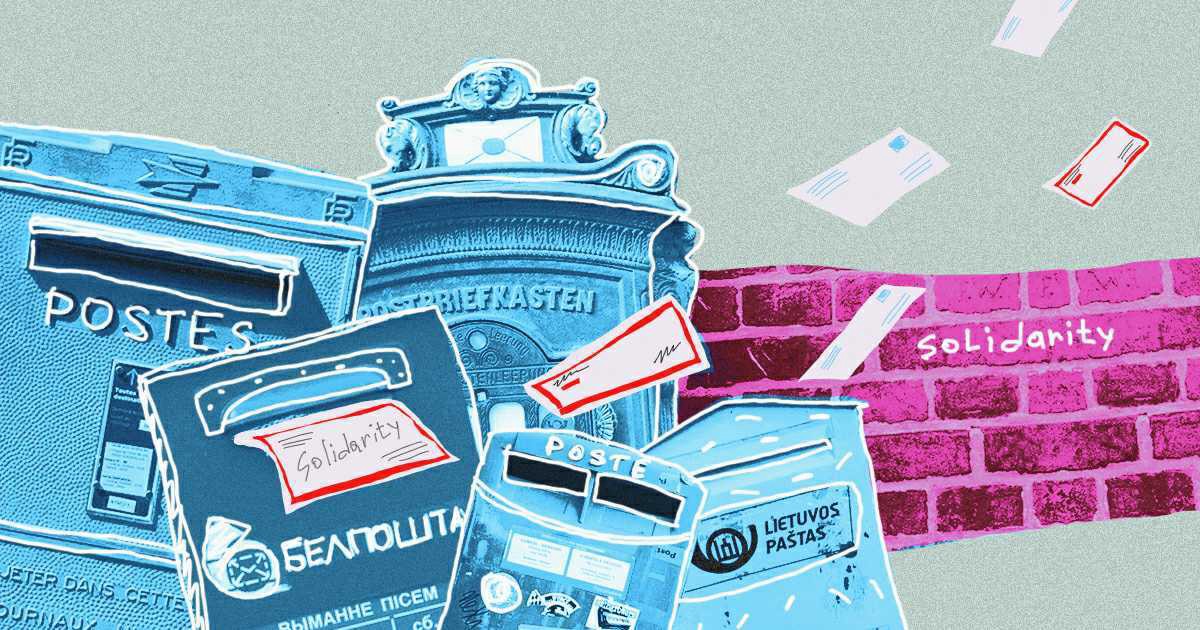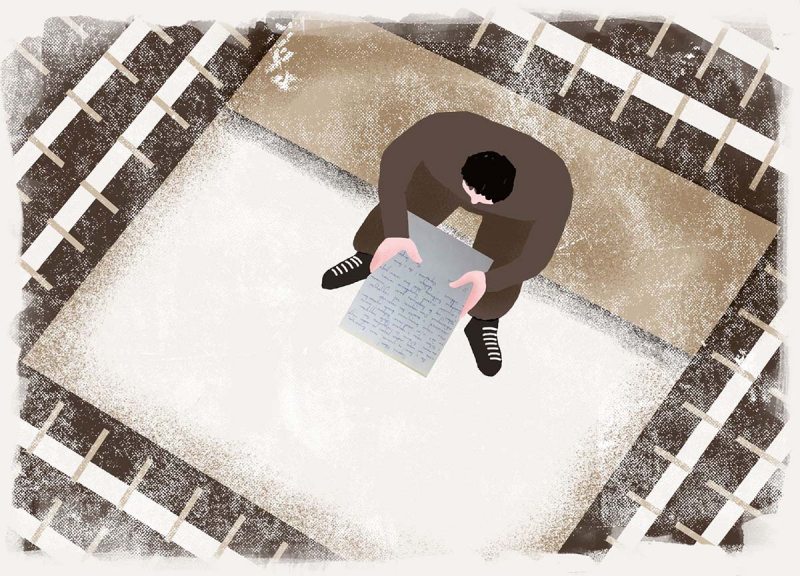Support has no boundaries: how to write letters to political prisoners if you are outside of Belarus
You wake up, scroll your news feed, reply to your friends in messengers, go to a coffee shop, talk to your neighbors while walking — unlimited number of communications with the outside world in just one morning. Your letter and conversations with a lawyer — these are the only ways to communicate with the outside world for a political prisoner. That is why it is important for prisoners to have this connection and support. In addition, the letters are a specific message to the regime: no human rights violations are tolerated and will be closely followed by the international community.
Yet, political prisoners in Belarus face mass violations of their rights, including not being given all the letters sent to them. The reason for censorship may be a subjective factor, when it is unclear why certain letters did not reach the recipient. But still there are certain rules that increase the chances of your letter being received by a political prisoner.
To make the process easier for foreigners, we have prepared answers to the questions that arise most often. We hope they will help take the first step in solidarity with Belarusian political prisoners.
What language should be used to write letters?
Letters should be written exclusively in Belarusian or Russian: otherwise, political prisoners won't receive them.
How can a foreigner write a letter in Russian or Belarusian?
You can go to online translating services like Google Translate, or use our templates specially prepared for this purpose.
|
Birthday template: 1. Belarusian: Добры дзень, (імя/name)! Мяне завуць (імя/name), я пішу вам з (горад/краіна, city/country) з самымі шчырымі віншаваннямі з Днём Народзінаў! Нават за дзясяткі і сотні кіламетраў пра Вас, Вашую смеласць і годнасць ведаюць ды натхняюцца многія-многія людзі. Дзякуй за годны прыклад! Зычу Вам не падаць духам і мець трывалае здароўе. З Днём Народзінаў! Russian: Добрый день, (имя/name)! Меня зовут (имя/name), я пишу вам из (город/страна, city/country) с самыми искренними поздравлениями с днем рождения! Даже за десятки и сотни километров многие-многие люди про Вас знают и вдохновляются вашим мужеством и достоинством. Спасибо за достойный пример! Желаю Вам не унывать и крепкого здоровья. С днем рождения! English: Hello, (name)! My name is (name), I am writing to you from (city/country) with the most sincere birthday greetings! Even tens and hundreds of kilometers away, many, many people know about you and are inspired by your courage and dignity. Thanks for a worthy example! I wish you not to be discouraged and good health. Happy birthday! 2. Belarusian: Вітаю, (імя/name)! Я даведаўся пра Вас у (горад/краіна, city/country), хоць бы гэта і далёка ад Беларусі. Чаму? Таму што гісторыі пра годных беларусаў і іх смеласць лётаюць па ўсім свеце, натхняючы дзясяткі і сотні чалавек! Я хачу павіншаваць Вас з Днём Народзінаў і пажадаць усяго, што адгукаецца ў сэрцы! Будзьце шчаслівыя! Russian: Здравствуйте, (имя/name)! Я узнал о Вас в (город/страна, city/country), хотя это и далеко от Беларуси. Почему? Ведь рассказы о достойных белорусах и их мужестве летают по всему миру, вдохновляя десятки и сотни людей! Хочу поздравить Вас с днем рождения и пожелать всего, что отзывается в Вашем сердце! Будьте счастливы! English: Hello, (name)! I learned about you in (city/country), although it is far away from Belarus. Why? Because stories about worthy Belarusians and their courage fly around the world, inspiring tens and hundreds of people! I want to congratulate you on your birthday and wish you everything that echoes in your heart! Be happy! |
|
Support template: 1. Belarusian: Шаноўны_ая (імя/name)! Я захапляюся Вашай смеласцю! Ведайце, што пра Вас ведаюць далёка за межамі Беларусі і падтрымліваюць! Прыміце ад (краіна/country) самыя шчырыя словы салідарнасці! (Імя, горад, дата/name, city, date) Russian: Уважаемый_ая (имя/name)! Восхищаюсь Вашей смелостью! Знайте, что люди далеко за пределами Беларуси знают о Вас и поддерживают Вас! Примите от (страны/country) самые искренние слова солидарности! (Имя, город, дата/ name, city, date) English: Dear (name), I admire your courage! Know that people far beyond Belarus know about you and support you! Accept the most sincere words of solidarity from (country)! (Name, city, date) 2. Belarusian: Добры дзень, (імя/name)! Я пішу Вам з (краіна, горад/country, city). Мы тут пра вас шмат гутарым і захапляемся. Упэўнены, Вы неверагодна моцны чалавек. І годны прыклад для нас усіх! Трымайцеся, разам мы зможам многае! (Імя, горад, дата/name, city, date) Russian: Здравствуйте, (имя/name)! Пишу Вам из (страны, города/country, city). Мы здесь много говорим о Вас и восхищаемся вами. Уверены, что Вы невероятно сильный человек. И достойный пример для всех нас! Держитесь, вместе мы можем многое! (Имя, город, дата/name, city, date) English: Hello, (name)! I am writing to you from (country, city). We talk a lot here about you and admire you. We are sure that you are an incredibly strong person. And a worthy example for all of us! Hold on, we can do a lot together! (Name, city, date) |
More templates can be found here.
How do I correctly write the name and address of the prisoner? In what language?
It is better to write the name and address in Belarusian or Russian: this will help the letter travel faster - accordingly, the mail will arrive sooner. In addition, the exact English spelling of the name is not always known. But if it is written in Latin, this should not cause any problems either.
Is it possible to send a stamp and an envelope together with a letter so that political prisoners could write back?
This is the right decision. Not all political prisoners have enough envelopes and especially stamps that can be mailed abroad. Find out at your local post office which stamps and envelopes will definitely come back from Belarus to your country, and put them together with the letter. You should also include a blank sheet of paper, so that the prisoner could write you back.
Is there any censorship? Are all letters passed to the prisoners?
All incoming and outgoing letters are read by a certain person, usually a censor. He or she may, at their discretion, allow the letter to pass unchanged, redact some words, phrases or pages in the letter, or have the entire letter destroyed. Imagine that someone else is reading your conversation: if he does not understand something, he can delete it or block the message.
What will never be delivered to the recipient?
Letters written in secret codes or ciphers, other conventions or jargon, as well as cynical letters and those aimed at causing harm to the government, public associations and individuals or containing information that constitutes a state or official secret.
What else should not be written in a letter? Is it allowed to write news?
- If a person is at the stage of investigation, then a criminal case should not be discussed with them. Don’t mention in the letters other people who may be somehow connected to the case.
- Do not use expressions in letters that may be considered extremist.
- Avoid political topics.
- Do not use obscene language, abbreviations or foreign words.
- Avoid various allegorical or metaphorical expressions, because they can be interpreted as an encrypted message or instruction to do something.
- Carefully pick the news you want to share: for example, if you know for sure that the prisoner is interested in football, you can discuss the latest events in the football world.
But no matter how you follow the rules, censorship is a thing that, unfortunately, does not always work according to any defined rules.
What are you allowed to write?
First of all, say hello and tell a little bit about yourself. Secondly, it would be great if you could find a topic for discussion that the prisoner would find interesting. You can find some additional information about political prisoners here. If you can’t come up with an interesting topic, just describe your day, or what new things you saw, read or heard. You can also write about your travels, impressions and emotions. Or figuratively describe what the prisoners are unable to see: even such everyday things as the birds twittering outside the window. It is also necessary to put the date and number the sheets of the letter.
How long does it take for letters to reach prisoners?
The timing depends on the country of origin and the measures their governments apply to fight the coronavirus. For example, a letter from Ukraine usually arrives within a week, from Georgia - within a month. Contact your local post office for exact periods, but remember that it may be increased due to censorship.
Can I send printed letters or do I need to write by hand?
It is better to write letters by hand: this increases the probability of them reaching the recipient. If for some reason you cannot write by hand, fill out this form and the team of volunteers working with the Solidarity Postcards Workshop will soon sign your postcard and mail it to the prisoner. (The link leads to a form in Belarusian: please, use Google Translate to find your way through it. A little hint: in the first question, you will have to choose the addressee, in the second - write the text of the letter, in the third -indicate the return address, if you’re OK with that.)
Letters are of particular value for political prisoners. There, behind the barbed wire, they are under constant moral and psychological pressure: “You are wrong, everyone has forgotten about you, nobody needs you”. These thoughts may be stifling. That's why letters help a lot in such situations. This is an act of solidarity and support. In fact, this is the only way to show them that we are with them and believe in what they have done and are doing.

List of political prisoners
As of January 16, 185 persons in Belarus are considered as political prisoners



















